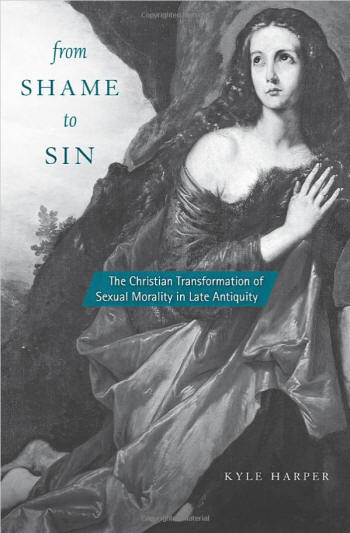Book Review
From Shame to Sin:
The Christian Transformation of Sexual Morality
in Late Antiquity
Kyle Harper
Harvard University Press
ISBN: 978-0674072770
 Far
from being a world of sexual liberation, pagan Rome was one of sexual
enslavement and the Romans had every reason to be ashamed of this aspect
of their society. The early Christians transformed the ethics of sexual
behaviour from shame to sin. So says the author of this informative book.
Far
from being a world of sexual liberation, pagan Rome was one of sexual
enslavement and the Romans had every reason to be ashamed of this aspect
of their society. The early Christians transformed the ethics of sexual
behaviour from shame to sin. So says the author of this informative book.
The author writes that the participants of this sexual excess were far from free: "Many were slaves ... the primary school of sexual endeavour remained, to an unusual degree, the bodies of slaves along with the bodies of the poor and of prostitutes..." Thus sexual behaviour in pagan Rome was an expression of the rich and powerful exploiting the poor and weak.
Little wonder, then, that the early Christians were horrified by the sexual depravity of the pagan world. They saw it in terms of an act of rebellion against God, the ultimate form of slavery. What the Christians wanted was freedom and pagan sexual depravity was thus utterly rejected. The author appears critical of this Christian "spasm of hate" but what else could they do? It might be argued that they should have abolished slavery in the way that they abolished sexual excess. But they were confronted by a slave-based economy and too rapid a change would have led to economic chaos. In contrast, the eradication of sexual excess was an act of liberation received with gratitude, especially by women.
Unlike the pagan fatalists, the Christians believed in free will. The pagans thought that the wealthy were destined by the gods to sexually control the weak. In contrast, the Christians believed that a life centred on God will lead to freedom from any form of sexual enslavement. Sin is not what we are but a way that we are, a way that can be eliminated.
The Christians saw sexual activity as something good within marriage. In contrast to the pagans, they proclaimed the dignity of women. Sexual activity outside of marriage was condemned. Prostitution was also outlawed. The pagans regarded the human body as belonging to the state and sexual behaviour as having to do with power. The Christians did not regard sexual behaviour in this context of social status. Each person, slave or not, was regarded as a moral agent dignified with free will.
The Christian transformation of sexual behaviour was by no means gradual. There was a rupture with the pagan past. It largely began in the fifth century and culminated in the sixth century reforms of Justinian, says the author. The focus moved from shame and reputation to sin and salvation. As Harper notes, the underlying reasons were far from novel: they were there in the Letters of Saint Paul. The rejection of pagan sexual behaviour represented a rejection of paganism as such.
This is an informative book which tells us why the early Christians so definitively rejected pagan sexual values.
Reviewed by Dr Pravin Thevathasan
